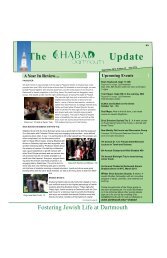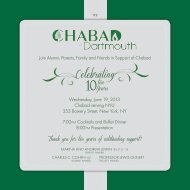Our New Website Upcoming Events - Chabad At Dartmouth
Our New Website Upcoming Events - Chabad At Dartmouth
Our New Website Upcoming Events - Chabad At Dartmouth
You also want an ePaper? Increase the reach of your titles
YUMPU automatically turns print PDFs into web optimized ePapers that Google loves.
Birthright Blog: Amanda Marinoff `12<br />
I couldn’t fall asleep last night. No, it was not because I was worried about exams or because the hotel mattress was incommodious; for<br />
the first time in my life, I lay awake pondering questions about Judaism, Israel, spirituality and my relationship to these complex, multifac-<br />
eted concepts. The questions kept coming: What does it really mean to be Jewish? Does God truly exist? Why is Israel important, and<br />
what gives Jews the right to a homeland? Why should I follow the commandments of the Torah, especially some of the ostensibly trivial,<br />
nitpicky mitzvot? How can I reconcile my seemingly conflicting faith in science with the ideals of Judaism?<br />
As the questions continued to flow and tumble aimlessly around my mind at 3 a.m., I half-laughed to myself. These kinds of questions<br />
would pop up from time to time, but I’d previously dismissed them with a wholly disinterested shrug. I couldn’t believe that I actually<br />
cared about these issues, let alone that they were keeping me up at night. Yes, my tired eyes yearned for sleep, and yes, I was aware that<br />
some would view these questions as blasphemous; yet I felt a grin spreading across my face, as I thought to myself, “I guess that’s<br />
what a few days in Israel will do to you.” Indeed, I have spent a mere five days in Israel, but a multitude of experiences have caused me<br />
to analyze, challenge, clarify, re-question, and confirm my relationship to Judaism, as well as my fundamental values and beliefs. I’ll share<br />
my reflections on just a few of those thought-provoking experiences.<br />
<strong>Our</strong> celebration of Shabbat in the Nazareth hotel was the first time I began to truly apprehend and appreciate the true meaning and spe-<br />
cialness of the Sabbath. Sure, I had lit candles, said the blessing ending in “Shel Shabbat,” and eaten challah on many Friday nights be-<br />
fore, but soon after I had finished eating my matzoh ball soup, I would go on my merry way in my typical “go-go-go” spirit, forgetting to<br />
differentiate Shabbat as a special day to pause, forgetting to breathe, forgetting what Shabbat is all about. This Shabbat, the first time I<br />
had decided to unfetter myself from all things digital and “work”-related, not only did my jet-lagged body appreciate the rest, but I began<br />
to let go of my preconceived judgments and self-fulfilling prophesies. As we sang and consecrated the day with good food and wine and<br />
laughter, reflected on important, sometimes unanswerable questions, and “rapped with the Rabbi,” I began to let go of my dismissive<br />
views that I can’t afford to take a day of rest and of such cynical questions as, “ Who cares if I turn on the lights or use my cell phone?” I<br />
concede that I may still be skeptical that God created the world in six days and rested on the seventh, but I am no longer skeptical that<br />
celebrating Shabbat in the true spirit of the holiday – disconnected from the trivial and more deeply connected to the things that really<br />
Student Spotlight<br />
Name: Daniel Rozenfeld<br />
Age: 21<br />
Major: Econ Major, Financial Math Minor<br />
I found my way to my first Shabbat dinner at <strong>Chabad</strong><br />
at <strong>Dartmouth</strong> in the same way I�m sure many a � nice<br />
Jewish� boy and girl did: my mother guilted me into<br />
it. I grew up in a fairly secular home and had few<br />
Jewish friends in high school. When I turned 13, I<br />
decided to forgo a bar mitzvah, the most � Jewish� thing in my life being<br />
Hanukah candles. When I arrived at <strong>Dartmouth</strong>, being Jewish was<br />
the last thing on my mind. I had no expectation of Judaism meaning<br />
any more to me in the future than it hitherto had.<br />
It was not until my junior year that I finally relented and decided<br />
to give <strong>Chabad</strong> a chance, if only to call home and report that I<br />
had done so. The last thing I expected was a meaningful engagement<br />
with a tradition I did not consider to be my own. Upon arrival, Rabbi<br />
Gray greeted me as if I had been visiting <strong>Chabad</strong> for years. Having<br />
forgotten to cover my head upon entry, students I had only met in passing<br />
guided me towards the basket of Yarmulkes by the door and motioned<br />
for me to sit, stand and drink upon blessing. I was welcomed<br />
with open arms by the family I didn�t know I had, three thousand miles<br />
from home,<br />
A year later, I found myself flying to Israel as a participant in<br />
the <strong>Chabad</strong> at <strong>Dartmouth</strong> Birthright trip. After nine of the most exciting<br />
and meaningful days of my life, I stood beside Rabbi Gray, facing Jerusalem�s<br />
Western Wall, surrounded by friends, old and new. As I became<br />
a Bar Mitzvah, I spoke on the place Judaism had come to occupy<br />
in my life . I stood there reminded of my first Shabbat dinner, reluctantly<br />
realizing that my mother had been right: better eight years late<br />
than never.<br />
Life at <strong>Dartmouth</strong><br />
matter –can be a beautiful thing, and that I can implement many<br />
aspects (even if I’m not following the exact letter of the law) in my<br />
life, despite the sometimes formidable challenge of “hitting the<br />
breaks” when the world seems to be going ahead (to where, I don’t<br />
know) at full speed.<br />
If you’d asked me before my trip to Israel what Judaism means to<br />
me, I’d tell you two simple yet extremely powerful words: family<br />
and community. My experiences on Birthright thus far have reaf-<br />
firmed for me the deep importance of these ideals both to me per-<br />
sonally and to the Jewish people as a whole. While I would previ-<br />
ously roll my eyes at those who espouse seemingly dogmatic, ex-<br />
treme views and stifle a laugh at those who preach with overblown<br />
rhetoric, I have learned much by allowing myself to listen with an<br />
open mind to a variety of different perspectives. Through listening<br />
to Avraham speak in sheer wonderment about the oneness of the<br />
Jewish family, Daniel speak about the indestructible power of the<br />
Jews when united, Aryeh fiercely proclaim his unshakable loyalty to<br />
the Jewish people, and the Israeli soldiers share their love of their<br />
country and their people, it has become clear that what I have al-<br />
ways valued most deeply about religion -- the sense of family and<br />
coming together – is not merely a byproduct of religious holidays<br />
but rather a deeply rooted value that has underpinned Judaism for<br />
thousands of years.<br />
I had an interesting conversation with Rabs yesterday that helped<br />
me to better understand the purpose of the Torah and allowed me<br />
to conceptualize its teachings in a way that I am able to fit into<br />
my understanding of the world. My question, “Why should it matter<br />
whether we wait four hours or six hours between eating dairy<br />
and meat?” turned into a discussion about the Torah as a mechanism<br />
to maintain the balance of the universe, the vital importance<br />
of the world’s finest details, and the interconnectedness of all humans<br />
and all of nature. The rabbi’s answer was unexpected, and it<br />
unexpectedly made sense to me. I have been constantly reminded<br />
of the (Continued on back page)




